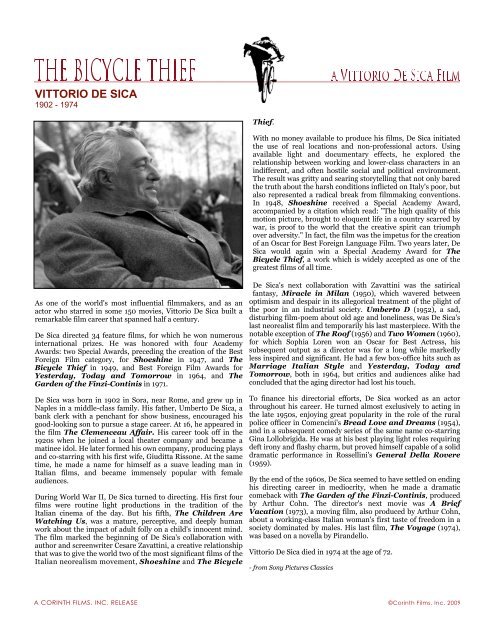the bicycle thief - Corinth Releasing
the bicycle thief - Corinth Releasing
the bicycle thief - Corinth Releasing
Create successful ePaper yourself
Turn your PDF publications into a flip-book with our unique Google optimized e-Paper software.
VITTORIO DE SICA<br />
1902 - 1974<br />
As one of <strong>the</strong> world's most influential filmmakers, and as an<br />
actor who starred in some 150 movies, Vittorio De Sica built a<br />
remarkable film career that spanned half a century.<br />
De Sica directed 34 feature films, for which he won numerous<br />
international prizes. He was honored with four Academy<br />
Awards: two Special Awards, preceding <strong>the</strong> creation of <strong>the</strong> Best<br />
Foreign Film category, for Shoeshine in 1947, and The<br />
Bicycle Thief in 1949, and Best Foreign Film Awards for<br />
Yesterday, Today and Tomorrow in 1964, and The<br />
Garden of <strong>the</strong> Finzi-Continis in 1971.<br />
De Sica was born in 1902 in Sora, near Rome, and grew up in<br />
Naples in a middle-class family. His fa<strong>the</strong>r, Umberto De Sica, a<br />
bank clerk with a penchant for show business, encouraged his<br />
good-looking son to pursue a stage career. At 16, he appeared in<br />
<strong>the</strong> film The Clemenceau Affair. His career took off in <strong>the</strong><br />
1920s when he joined a local <strong>the</strong>ater company and became a<br />
matinee idol. He later formed his own company, producing plays<br />
and co-starring with his first wife, Giuditta Rissone. At <strong>the</strong> same<br />
time, he made a name for himself as a suave leading man in<br />
Italian films, and became immensely popular with female<br />
audiences.<br />
During World War II, De Sica turned to directing. His first four<br />
films were routine light productions in <strong>the</strong> tradition of <strong>the</strong><br />
Italian cinema of <strong>the</strong> day. But his fifth, The Children Are<br />
Watching Us, was a mature, perceptive, and deeply human<br />
work about <strong>the</strong> impact of adult folly on a child's innocent mind.<br />
The film marked <strong>the</strong> beginning of De Sica's collaboration with<br />
author and screenwriter Cesare Zavattini, a creative relationship<br />
that was to give <strong>the</strong> world two of <strong>the</strong> most significant films of <strong>the</strong><br />
Italian neorealism movement, Shoeshine and The Bicycle<br />
����� �� ������������ ���� ������������������������������������������������������������������������������������������������������������������������������������������������������������������������������������������������������������������������<br />
Thief.<br />
With no money available to produce his films, De Sica initiated<br />
<strong>the</strong> use of real locations and non-professional actors. Using<br />
available light and documentary effects, he explored <strong>the</strong><br />
relationship between working and lower-class characters in an<br />
indifferent, and often hostile social and political environment.<br />
The result was gritty and searing storytelling that not only bared<br />
<strong>the</strong> truth about <strong>the</strong> harsh conditions inflicted on Italy's poor, but<br />
also represented a radical break from filmmaking conventions.<br />
In 1948, Shoeshine received a Special Academy Award,<br />
accompanied by a citation which read: "The high quality of this<br />
motion picture, brought to eloquent life in a country scarred by<br />
war, is proof to <strong>the</strong> world that <strong>the</strong> creative spirit can triumph<br />
over adversity." In fact, <strong>the</strong> film was <strong>the</strong> impetus for <strong>the</strong> creation<br />
of an Oscar for Best Foreign Language Film. Two years later, De<br />
Sica would again win a Special Academy Award for The<br />
Bicycle Thief, a work which is widely accepted as one of <strong>the</strong><br />
greatest films of all time.<br />
De Sica's next collaboration with Zavattini was <strong>the</strong> satirical<br />
fantasy, Miracle in Milan (1950), which wavered between<br />
optimism and despair in its allegorical treatment of <strong>the</strong> plight of<br />
<strong>the</strong> poor in an industrial society. Umberto D (1952), a sad,<br />
disturbing film-poem about old age and loneliness, was De Sica's<br />
last neorealist film and temporarily his last masterpiece. With <strong>the</strong><br />
notable exception of The Roof (1956) and Two Women (1960),<br />
for which Sophia Loren won an Oscar for Best Actress, his<br />
subsequent output as a director was for a long while markedly<br />
less inspired and significant. He had a few box-office hits such as<br />
Marriage Italian Style and Yesterday, Today and<br />
Tomorrow, both in 1964, but critics and audiences alike had<br />
concluded that <strong>the</strong> aging director had lost his touch.<br />
To finance his directorial efforts, De Sica worked as an actor<br />
throughout his career. He turned almost exclusively to acting in<br />
<strong>the</strong> late 1950s, enjoying great popularity in <strong>the</strong> role of <strong>the</strong> rural<br />
police officer in Comencini's Bread Love and Dreams (1954),<br />
and in a subsequent comedy series of <strong>the</strong> same name co-starring<br />
Gina Lollobrigida. He was at his best playing light roles requiring<br />
deft irony and flashy charm, but proved himself capable of a solid<br />
dramatic performance in Rossellini's General Della Rovere<br />
(1959).<br />
By <strong>the</strong> end of <strong>the</strong> 1960s, De Sica seemed to have settled on ending<br />
his directing career in mediocrity, when he made a dramatic<br />
comeback with The Garden of <strong>the</strong> Finzi-Continis, produced<br />
by Arthur Cohn. The director's next movie was A Brief<br />
Vacation (1973), a moving film, also produced by Arthur Cohn,<br />
about a working-class Italian woman's first taste of freedom in a<br />
society dominated by males. His last film, The Voyage (1974),<br />
was based on a novella by Pirandello.<br />
Vittorio De Sica died in 1974 at <strong>the</strong> age of 72.<br />
- from Sony Pictures Classics


